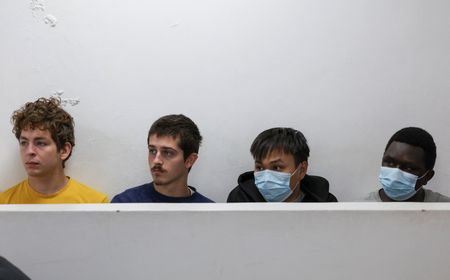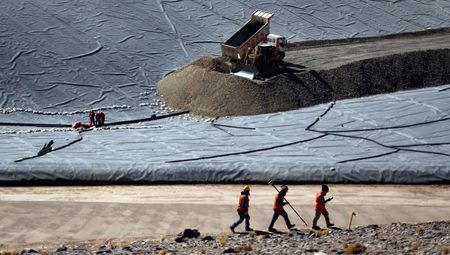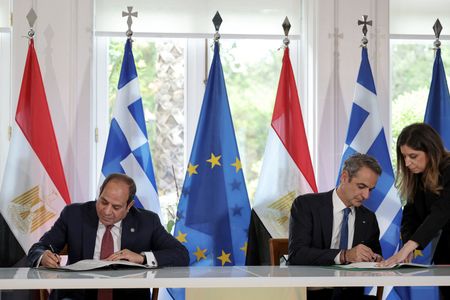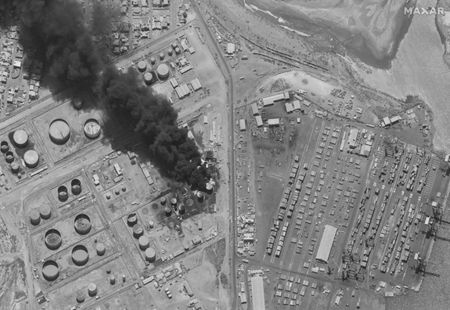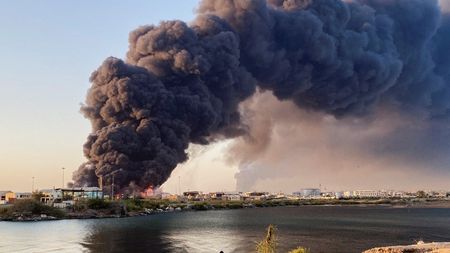By Phil Stewart, Idrees Ali and Humeyra Pamuk
WASHINGTON (Reuters) – U.S. President Donald Trump’s administration may deport migrants to Libya for the first time this week, three U.S. officials said on Tuesday, as part of his immigration crackdown and despite Washington’s past condemnation of Libya’s harsh treatment of detainees.
Two of the officials said the U.S. military could fly the migrants to the North African country as soon as Wednesday, but stressed that plans could change.
The Pentagon referred queries to the White House. The White House and Department of Homeland Security did not immediately respond to requests for comment.
A State Department spokesperson said: “We do not discuss the details of our diplomatic communications with other governments.”
Reuters could not determine how many migrants would be sent to Libya or the nationalities of the individuals that the administration is eyeing for deportation.
Libya’s Government of National Unity said on Wednesday it rejected the use of Libyan territory as a destination for deporting migrants without its knowledge or consent. It also said there was no coordination with the United States regarding the reception of migrants.
Khalifa Haftar’s Libyan National Army, which controls eastern Libya, also rejected in a statement the idea of the country taking migrants deported from the United States, saying it “violates the sovereignty of the homeland”.
Trump, who made immigration a major issue during his election campaign, has launched aggressive enforcement action since taking office, surging troops to the southern border and pledging to deport millions of immigrants in the United States illegally.
As of Monday, the Trump administration has deported 152,000 people, according to DHS.
The administration has tried to encourage migrants to leave voluntarily by threatening steep fines, trying to strip away legal status, and deporting migrants to notorious prisons in Guantanamo Bay and El Salvador.
LIFE-THREATENING
In its annual human rights report released last year, the U.S. State Department criticized Libya’s “harsh and life-threatening prison conditions” and “arbitrary arrest or detention.”
In its travel advisory, the Department advises U.S. citizens against visiting the country due to “crime, civil unrest, kidnapping and armed conflict.”
Libya’s west is overseen by the GNU under Prime Minister Abdulhamid al-Dbeibah, who was installed in Tripoli through a U.N.-backed process in 2021. Eastern Libya has a parallel administration and is controlled by commander Khalifa Haftar’s Libyan National Army.
Major fighting ended with a truce in 2020 but the underlying political dispute between the sides remains and there are sporadic clashes between rival factions.
U.S. Secretary of State Marco Rubio last week said the United States was not satisfied only with sending migrants to El Salvador, and hinted that Washington was looking to expand the number of countries that it may deport people to.
“We are working with other countries to say: We want to send you some of the most despicable human beings, will you do this as a favor to us,” Rubio said at a cabinet meeting at the White House last Wednesday.
“And the further away from America, the better.”
A fourth U.S. official said the administration has for several weeks been looking at a number of countries to send migrants to, including Libya.
It wasn’t immediately clear if the administration had struck an agreement with the Libyan authorities to accept deportees of other nationalities.
On April 19 the Supreme Court justices temporarily barred the Trump administration from deporting a group of Venezuelan migrants it accused of being gang members. Trump’s administration, which has invoked a rarely used wartime law, has urged the justices to lift or narrow their order.
It is unclear what kind of due process might be underway ahead of any Libya deportations.
Libya has had little peace since a 2011 NATO-backed uprising, and it split in 2014 between eastern and western factions, with rival administrations governing in each area.
A Tripoli-based Government of National Unity under Prime Minister Abdulhamid al-Dbeibah was installed through a U.N.-backed process in 2021 but the Benghazi-based House of Representatives no longer recognizes its legitimacy.
(Reporting by Humeyra Pamuk, Idrees Ali and Phil Stewart; Additional reporting by Hani Amara in Istanbul, Ayman al-Werfali in Benghazi, Gram Slattery and Ted Hesson; Editing by Michael Perry and Chizu Nomiyama)


